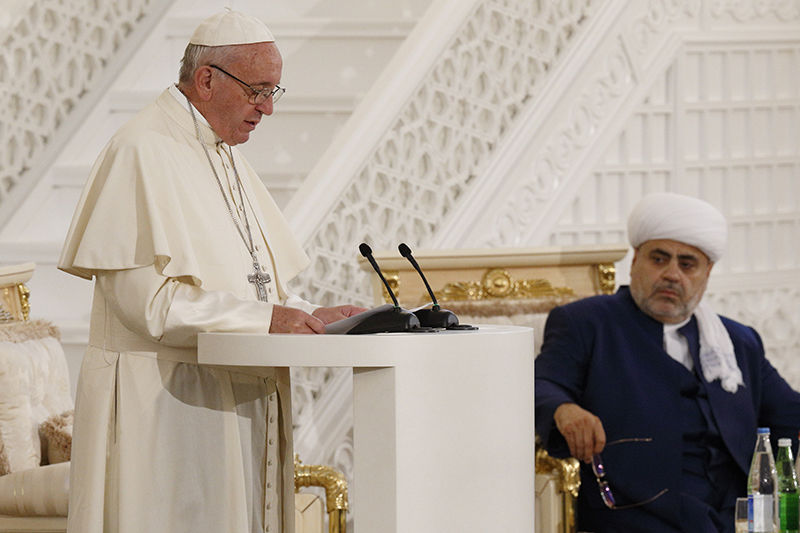Baku, Azerbaijan, Oct 2, 2016 / 08:21 am (CNA/EWTN News).- In his final speech in Azerbaijan, Pope Francis spoke at length praising the good interreligious relations in the country, but also cautioned that religion must always be respected in civil society, and can never be used as a tool to justify violence.
“Society must always overcome the temptation to take advantage of religious factors,” the Pope said Oct. 2. Religions, he said, “must never be instrumentalized, nor can they ever lend support to, or approve of, conflicts and disagreements.”
To illustrate his point, the Pope referred to the traditional artistic windows of Azerbaijan made solely out of wood and tinted glass, with no glue or nails used in the process. With the traditional means of crafting, the wood and the glass are set together through “time-consuming and meticulous effort,” leading the wood to support the glass, which in turn lets the light in, he observed.
Using this method as a metaphor, he said it is “the task of every civil society to support religion, which allows a light to shine through, indispensable for living.” In order for this to happen, “an effective and authentic freedom must be guaranteed,” and artificial forms of “glue” that “bind people to believe, imposing on them a determined belief system and depriving them of the freedom to choose,” cannot be used.
The Pope also condemned the use of “external nails” such as worldliness and the yearning for power and money. God, he said, “cannot be used for personal interests and selfish ends; he cannot be used to justify any form of fundamentalism, imperialism or colonialism.” He then made a heartfelt appeal for “no more violence in the name of God! May his most holy Name be adored, not profaned or bartered as a commodity through forms of hatred and human opposition.”
Pope Francis traveled to Azerbaijan as the last stop of his three-day trip there and to Georgia, both of which have a small minority of Catholics. Azerbaijan marks the first time the Pope has ever traveled to a majority Shi’ite nation. The last encounter of the day was an ecumenical meeting that brought together Allahshükür Hummat Pashazade, who as Sheikh and Grand Mufti of the Caucasus is one of the most influential Muslim voices in the world, as well as the local religious leaders of the Russian Orthodox Church and those of the Jewish communities.
In his speech, Francis highlighted the good relations Catholics enjoy with Muslims in the area, pointing to “the tangible help” that the Islamic leader has offered to the Catholic community on several occasions. He also pointed to the positive relationship between Catholics and Orthodox in the area, as well as the friendship they enjoy with the Jews.
There is a desire within Azerbaijan to protect the religious heritage of each and to pursue greater openness, he said, adding that “it is not opposition but cooperation that helps to build better and more peaceful societies.” The fraternity sought by the various religions in the area directly opposes those who wish to focus on division or reawaken tensions that come from opposition and differences, he said.
Opening oneself to others “does not lead to impoverishment but rather enrichment, because it enables us to be more human,” he said, adding that it helps all parties to act “with neither abstract idealism nor with interventionism, not by harmful interference or forceful actions, but rather out of respect for the dynamics of history, cultures and religious traditions.”
Religions, he said, have the key task of accompanying people through life, helping them to understand that “the center of each person is outside of himself, that we are oriented toward the Most High and toward the other who is our neighbor.” Part of this task involves providing authentic answers to those who often find themselves lost among “the swirling contradictions of our time.” Among these contradictions is a seemingly dominant attitude of nihilism on the part of those who don't believe in anything “except their own well-being, advantage and profit,” he said.
On the other hand, there is a growing presence of “rigid and fundamentalist” attitudes from “those who, through violent words and deeds, seek to impose extreme and radical attitudes which are furthest from the living God.” Contrary to these attitudes, religions are called to build and foster “a culture of encounter and peace,” based on mutual understanding and humility. True peace, achieved through prayer and dialogue, is a duty for both Christians and other religious communities, he said.
To be open and hope for the good of others is not a type of “accommodating facile syncretism, nor a diplomatic openness which says yes to everything in order to avoid problems,” the Pope said. Rather, it is “a path of dialogue with others and a path of prayer for all,” allowing love to rise “where there is hatred, and forgiveness where there is offence, of never growing weary of imploring and tracing the ways of peace.”
“The blood of far too many people cries out to God from the earth,” he said, stressing that in the current global context, “we are challenged to give a response that can no longer be put off: to build together a future of peace.” “Now is not the time for violent or abrupt solutions, but rather an urgent moment to engage in patient processes of reconciliation,” he said, praying that amid the ongoing “night of conflict” overshadowing the global community, religions would be a sign of peace amid “the devastation of death.” The Pope prayed that religions, particularly in the Caucasus region, would be “active agents” in overcoming the tragedies and tensions of the past and present. “The treasures old and ever new of the wisdom, culture and religious sensibility of the people of the Caucasus, are a tremendous resource for the future of the region and especially for European culture,” he said, and prayed that they would always be known and valued.

